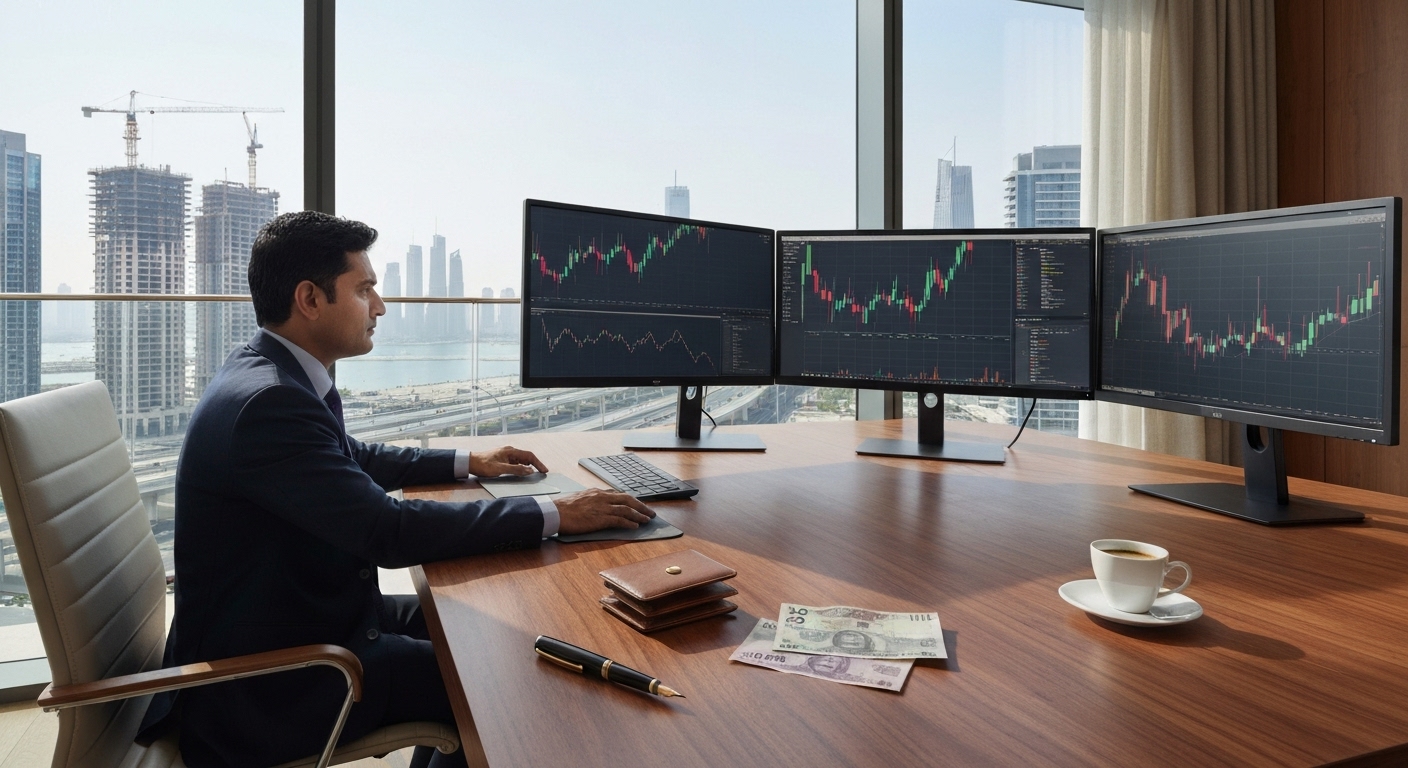For Indian High Net Worth Individuals, Dubai’s property market presents unprecedented opportunities, particularly when currency dynamics between the Indian Rupee and UAE Dirham are understood and strategically leveraged. As one of the few global safe havens offering premium real estate at competitive prices, Dubai continues attracting sophisticated Indian investors seeking portfolio diversification and capital appreciation.
Understanding the Indian Rupee (INR) and UAE Dirham (AED) Dynamics
The relationship between INR and AED significantly influences investment returns for Indian HNIs in Dubai’s property market. The UAE Dirham’s peg to the US Dollar creates stability, while the Indian Rupee’s fluctuations against major currencies present both challenges and opportunities for property investors.
Historical trends show periods where favorable exchange rates have enhanced property acquisition power for Indian investors. During rupee depreciation phases, the cost of Dubai properties increases in INR terms, while rupee strengthening periods offer enhanced purchasing power and improved investment entry points.
The Impact of Currency Fluctuations on Dubai Property Values for Indian HNIs
Currency movements directly affect the effective cost of property acquisition, ongoing maintenance expenses, and rental yield calculations. When the rupee weakens against the dirham, Indian investors face higher acquisition costs but potentially benefit from rental income that appreciates in INR terms when converted back.
Conversely, rupee appreciation reduces the effective property cost and enhances the attractiveness of new investments. HNIs must consider these dynamics when timing their property purchases, as currency movements can significantly impact overall investment returns over holding periods.
Strategic Approaches to Mitigate Currency Risk and Maximize Returns
Sophisticated HNIs employ several strategies to manage currency exposure effectively. Dollar-cost averaging through phased property payments during construction can reduce the impact of exchange rate volatility. Additionally, maintaining AED-denominated accounts for property-related expenses helps minimize transaction costs and currency conversion frequency.
Natural hedging through rental income diversification across multiple currencies provides another layer of protection. Properties generating rental income in AED or USD create a natural hedge against rupee depreciation, while strategic timing of repatriation decisions can optimize conversion rates.
Leveraging Favorable Exchange Rates for Property Acquisition and Repatriation
HNIs should monitor currency trends to identify optimal investment windows. Forward contracts and currency options can lock in favorable rates for planned property purchases, providing certainty in investment planning. This becomes particularly valuable for off-plan properties with extended payment schedules.
For repatriation strategies, timing becomes crucial. Understanding seasonal patterns, economic cycles, and geopolitical events that influence exchange rates enables more informed decisions about when to convert AED rental income or property sale proceeds back to INR.
Financial and Legal Considerations for Indian HNI Property Investors in Dubai
Navigating evolving foreign exchange regulations requires specialized structures when investing in premium Dubai real estate. HNIs must ensure compliance with Reserve Bank of India guidelines regarding overseas investments under the Liberalized Remittance Scheme, which allows individuals to invest up to $250,000 annually.
Tax optimization strategies should consider both Indian and UAE tax implications. Dubai’s tax-friendly environment, combined with proper structuring, can enhance after-tax returns while maintaining compliance with Indian tax obligations on global income.
Future Outlook: Predicting Currency Trends and Market Opportunities
Economic indicators suggest continued volatility in INR-AED exchange rates, driven by India’s economic growth trajectory, oil price movements affecting the UAE economy, and global monetary policy shifts. HNIs should prepare for this volatility by building flexible investment strategies that can adapt to changing currency conditions.
The UAE’s economic diversification initiatives and India’s expanding digital economy create long-term fundamentals supporting sustained investment flows between the two countries, potentially stabilizing currency relationships over extended periods.
Why Danube Properties is the Ideal Partner for Indian HNI Investors
Danube Properties has established itself as a preferred investment partner for Indian HNIs, having successfully catered to more than 112 nationalities with specialized services tailored to international investors’ needs. Our deep understanding of cross-border investment complexities enables seamless navigation of currency-related challenges.
With a proven track record of delivering premium developments like Elitz 2 at Jumeirah Village Circle, backed by over Rs 2000 crore investment commitments, Danube Properties combines market expertise with financial strength. Our team’s extensive experience in Dubai’s evolving market dynamics ensures investors receive guidance aligned with both local regulations and international investment best practices.
Indians have emerged as primary contributors to Dubai’s real estate market, and Danube Properties remains committed to providing the highest level of service to this important investor community, ensuring successful navigation of currency fluctuations while maximizing investment returns.




